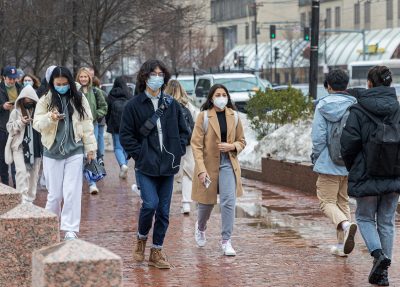
Boston University implemented a sick leave policy for its PhD student body Jan. 25, following years of campaigning by doctoral students.
The policy, about a year in the making, ensures PhD students have 15 consecutive or nonconsecutive sick days at their disposal and does not require students to make up days taken off due to illness.
The policy requires students to seek approval if they need additional time to fully recover. These requests are also “subject to funding agency restrictions,” the policy states.
BU had no formal guidelines surrounding sick leave for PhD students until last month. If unable to carry out regular responsibilities, such as teaching, due to illness or injury, students were expected to arrange a plan of action with their professors or potentially lose their apprenticeship role and five-year guaranteed stipend.
“It was completely up to the student to advocate for their case with their professor,” said Ian Chandler-Campbell, a sixth-year doctoral student in the School of Education. “A student had to hope that they and the professor could come up with a reasonable accommodation.”
Daniel Kleinman, the associate provost for graduate affairs — who said he presented the policy to the University Council — said it was urgent that it be approved due to the longstanding risk of losing a semester’s stipend if a student had to take a leave of absence.
“The only official University policy that was on the books was that students got some vacation time which should be separate from sick leave,” Campbell said.
Campbell, a member of the community task force that drafted the first version of the policy, said its main objective was to ensure doctoral students have the right to have a sick day without using a vacation day or taking a leave of absence, adding the policy’s implementation is “definitely a big win for the graduate student community.”
While mental health was considered in the first draft of the policy, Campbell noted its final version does not mention any ailments besides “illness or injury.”
Kleiman said his involvement was spurred after receiving a letter from several graduate students concerning the absence of policies surrounding sick leave.
“I met with the students and talked about the sick leave, or the absence of a sick leave policy,” Kleinman said. “It was clear that we should do something about this.”
Kleinman said the new policy’s priority — similar, he noted, to the vacation policy passed in 2019 — is to protect students. It also prevents students from taking advantage of the sick days by allowing departments to request a doctor’s note.
“I support [the policy] quite strongly. I think it’s a reasonable start,” Kleinman said. “We will review it in a couple of years to see how it’s working and whether there are ways that it needs to be altered.”
Ariel Kessel Akerman, a third-year doctoral student in the Graduate School of Arts and Sciences, said he sees the policy’s evolution from a vague set of expectations into a formal statement by the University as a significant improvement, adding the policy itself is flexible enough for circumstances in which students have to take more than 15 days off for serious illnesses.
“I felt that the new rules still have space for other sorts of arrangements,” Akerman said.
Campbell said the policy will be reviewed in two years.
“Nothing’s perfect, but we’re very grateful to BU for finally considering this proposal and approving it,” Campbell said. “It’s gonna do a lot of good.”
Correction: A previous version of this article identified Ian Chandler-Campbell as Ian Campbell. The article has been updated to reflect this change.


















































































































